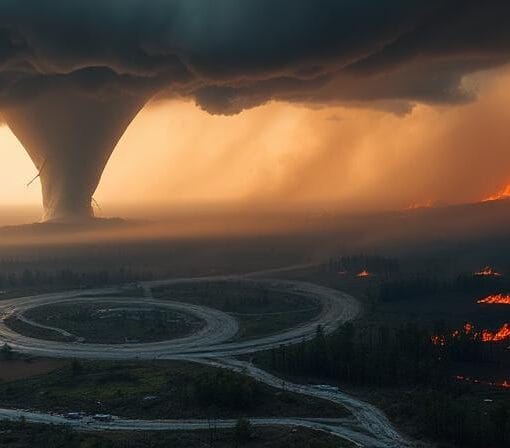Top Takeaways and Key Concepts
- Control panic early using breathing techniques to prevent emotional overwhelm in emergencies.
- Mentally rehearse emergency scenarios to improve decision-making and reduce fear.
- Build a trusted support network to share responsibilities and emotional strength during crises.
- Use stress relief tools like exercise and journaling to stay mentally clear and resilient.
- Create simple emergency plans and checklists to stay prepared and avoid confusion under pressure.
Summary of This Article
This article explains that mental preparation is just as important as physical survival tools during emergencies. It emphasizes learning how to control panic with breathing exercises and mindfulness so you can think clearly under stress. By mentally rehearsing scenarios, staying positive, and focusing on what you can control, you build emotional resilience. The article also encourages forming a support network with family and friends, practicing stress management techniques like journaling and exercise, and creating clear plans and checklists ahead of time. With these steps, you can face any crisis with confidence and a calm, prepared mindset.
Short Video Version of this Article
When something bad happens, it can seem like everything is out of whack. Staying calm certainly helps, whether it’s a large storm or your cat going crazy with the curtains. We all know the expression, “Keep calm and carry on.” But really, how many of us truly do that when things get out of hand?
It’s hard! Sometimes the world seems to be whirling. At those times, it’s important to take a deep breath. For real. Take a second to breathe in and out. It does matter.
Please Note: This post may contain affiliate links. If you click one of them, we may receive a commission at no extra cost to you. As an Amazon Associate, I earn from qualifying purchases.

It’s not enough to just have goods ready to go in case of an emergency. Of course, snacks and drinks are really vital, but what about your mind? It’s just as important to get ready mentally. You need to be ready for any trouble that comes your way.
So, let’s talk about being mentally ready. Get a snack, like some trail mix or those tasty granola bars you like. It doesn’t have to be hard. You may think of it as making a small safety net in your mind to help you deal with surprises better. When things get messy, even simple steps might help you feel more in charge.
Understanding the Power of Panic

Have you ever noticed how panic can spread faster than gossip at a family reunion? One moment everything is fine, and the next, someone yells “fire!” in a crowded theater—cue mass hysteria! Understanding how panic works is the first step in learning how to manage it.
Panic triggers our fight-or-flight response. It’s like being chased by a bear, except instead of a bear, it’s just an unexpected power outage during your favorite TV show.
Your heart races, palms get all sweaty, and suddenly it feels like your brain’s on vacation. I totally get it. Those feelings can hit hard when things go sideways. Recognizing them early is key to taking back control.
Here’s a thought: practice some mindfulness techniques when life’s calm. That way, when trouble pops up, you won’t be scrambling to remember how to breathe while looking for your lost sanity. Trust me, it helps!
Deep breathing exercises are super easy. Just inhale slowly through your nose and exhale out your mouth. It sounds simple, but wow, does it work! Counting backward from 100 can help too. It gives your mind something to focus on instead of the chaos around you.
Think about astronauts floating in space. They’ve got to keep their cool without gravity messing with them! If they can do that, we can definitely handle Aunt Edna’s casserole recipe going haywire or any other little hiccup life throws our way. You got this!
Building Your Emergency Mindset

Let’s see…what does it mean to have a “emergency mindset”? Picture yourself as a superhero, but without the cape (because capes are dangerous). It is getting ready psychologically before something bad happens so you don’t feel like a deer in headlights when things go wrong.
To get into this way of thinking, start by imagining different situations. For example, what would you do if there was an earthquake? Or what if zombies came (which seems more likely every day)? When these things happen in real life, they will seem less scary if you practice them in your head.
Believe it or not, staying positive definitely helps! I know it sounds like one of those dumb phrases with cats on it. But here’s the thing: being positive can really help us get through hard times.
When things get tough, simply remember how flexible we are as people. We can work things out, even if I sometimes doubt that because of how bad I am at camping. Do you remember when I tried to light a fire and all I did was make smoke? Yeah, not my best hour.
Being positive helps your brain work better. You may see solutions instead of problems when you wear superhero glasses. When things are tough, try to think about what you can control. It could be your reaction or what you do next. That small change can make a big difference.
So when life throws you a curveball, like forgetting the marshmallows for s’mores, simply take a deep breath and look for the good in it. It may be an adventure instead! You are stronger than you believe, and retaining that smile (or at least a smirk) can assist more than you might imagine.
Creating Your Support Network

But no one wants to handle an emergency alone, especially if there is food involved! You need a support network so you can be ready for anything. In case of an emergency, who else will share your stash of peanut butter cups?
Find friends and family members who have skills that work nicely with yours. For instance, one person might be great at logistics while another might be great at making terrible puns when they are under pressure (we all need a laugh). Make sure everyone in this network knows how to talk to each other so they know where to go when things become tough.
It’s necessary to talk to others, isn’t it? And you know what? Adding some funny parts can make it even better! It’s true that laughing might make you feel less stressed. Who doesn’t feel better after a good laugh?
Imagine launching a group chat where people share hilarious memes and ideas for staying alive. For example, “How to build a fire” with a cat trying to catch its tail. You would be learning something useful while having fun. It’s the best of both worlds!
Those little moments of joy may keep everyone together, even when things go hard. Imagine this: something bad happens, and instead of freaking out, you all send each other funny movies. I smile just thinking about it!
Laughter draws us together, especially when things are tough. It feels like a hug for your heart. Why not add some humor to your conversations? Send those funny cat videos or jokes about camping gone wrong. They’ll make everyone feel better and remind them that we’re all in this together.
And who wouldn’t want to view cute animals while getting ready for whatever happens? Let’s keep those grins on!
Practicing Stress Management Techniques

Honestly, everyone should know how to deal with stress, even if it’s only for that awkward family gathering when Uncle Bob won’t stop talking about his conspiracy theories about aliens attacking Earth.
Some useful things to do are physical exercises like yoga or going for lengthy walks outside (extra points if you see squirrels along the way). Exercise releases endorphins, which are chemicals that make you feel good, and it helps you think clearly when everything else is going wrong. Plus, nothing clears your head like running away from angry geese in the park!
Writing in a journal is a great tool. You may talk to yourself on paper like this. It’s helpful to write down your anxieties or worries regarding crises since it clears your mind. Do you ever have thoughts that go around in your head like a tornado? Writing can help soothe that storm.
Imagine this: instead of letting your problems pile up until you feel like you’re going to blow up, you just write them down. It feels great! Just think about how little things like losing your phone or spilling milk may develop into giant stress balls. Writing can help keep it from happening.
It’s simpler to deal with things when you let your feelings out. It’s like letting the air out of a balloon before it pops! What you thought was scary might not be so horrible after you write it down.
It doesn’t have to be fancy writing. Write down whatever comes to mind. “I’m worried about storms” or “What if I forget my emergency kit?” Easy stuff! Then you can see how far you’ve come since then.
So, the next time you’re worried, get out your journal and start writing. It’s a terrific approach to figure out what’s bugging you and find some calm in the middle of the craziness. Also, it’s nice to look back and see how much you’ve changed!
Preparing Mentally Before Disasters Happen
It’s quite sensible to get ready in your head before something unpleasant happens. I recall one time when I was running around like a crazy person trying to find my keys while carrying groceries. Not pleasant at all! Planning ahead is a lot better.
Lists can be quite helpful. Think about what you should do if something goes wrong. For example, how will you keep food secure during a storm? Or where is the safest place to leave your home in an emergency? Writing it down saves time and helps everyone stay calm when things get rough.
It’s also important to know what could happen in your location. You can get ready for floods or wildfires if you know they are coming. This implies you won’t be running around in circles when things go wrong. You will have a plan!
Think about how nice it would be to have everything in order before anything goes wrong. That sense of being ready is like having a warm blanket on a cold day. When people know what to do, they feel stronger and less terrified.
So now is a good time to think about these topics. Make those lists, study about the threats in your area, and make your mind ready. It is worth it! Also, you won’t have to frantically look for missing keys while carrying groceries anymore!
Frequently Asked Questions
What is mental preparedness and why is it important in emergencies?
Mental preparedness means training your mind to stay calm, think clearly, and react wisely during stressful situations. It’s important because panic causes confusion and bad decisions, while a prepared mind stays focused and increases your chances of staying safe.
How can I control panic when an emergency happens?
Start by recognizing the early signs of panic like rapid breathing or racing thoughts. Use deep breathing exercises—slow inhales through the nose and long exhales through the mouth—to calm your nerves and regain control before panic takes over.
What is an “emergency mindset” and how do I develop one?
An emergency mindset is the ability to stay focused and think logically during crises. You can develop it by imagining different emergency scenarios, mentally rehearsing your response, and staying positive by focusing on what you can control rather than what you can’t.
Why is having a support network helpful in crises?
A support network gives you emotional strength and practical help during tough times. Friends and family can share responsibilities, offer encouragement, and help you solve problems faster than trying to handle everything alone.
What are some easy stress management techniques I can use?
Try simple habits like walking, stretching, or doing yoga to release stress. Journaling also helps by clearing your thoughts and reducing mental overload. These techniques keep your mind strong and ready for emergencies.
How do I prepare mentally for a disaster before it happens?
Create a simple plan with step-by-step actions for different situations like storms, power outages, or evacuations. Write checklists, organize supplies, and learn about local risks. Thinking ahead reduces fear because you already know what to do.
Why should I limit exposure to distressing news during emergencies?
Constantly watching negative news increases fear and anxiety, which makes it harder to think clearly. Staying informed is good, but take breaks and focus only on reliable updates so you can stay calm and make smart decisions.
Suggested Resources:
Emergency Preparedness Guide
https://www.ready.gov/prepare
Mental Health During Emergencies
https://www.nami.org/Your-Journey/Individuals-with-Mental-Illness/Disaster-Preparedness
Coping Strategies During Crises
https://www.apa.org/topics/disasters

Kevin Collier is a seasoned outdoor enthusiast and writer for Trekbug.com, specializing in outdoor adventures, survival strategies, and prepping insights. With a deep love for nature and a commitment to self-sufficiency, Kevin empowers readers to embrace the wilderness confidently. He shares valuable tips, practical techniques, and inspiring stories, helping both novice and experienced adventurers develop essential skills for surviving and thriving in the great outdoors.





